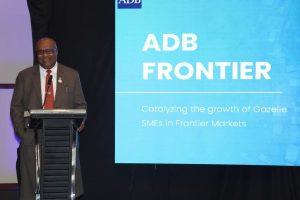
THE Asian Development Bank (ADB) is redefining its approach to support job creation and economic growth in Fiji and the Pacific, which is crucial for the region’s future transformation. This strategy, anchored on the new ADB-Fiji Country Partnership Strategy launched in 2024, pilots new tools to directly support small and medium enterprises (SMEs), unlocking the unique opportunities of Pacific Island economies.
There are already some early successes.
Last week, the ADB Frontier Seed (Pacific) program was launched in Suva. The program provides catalytic funding and technical support to fast-growing SMEs that are building new local industries but lack access to risk capital.
ADB Frontier’s customised approach of “cost-recoverable technical assistance” allows firms to access much-needed expansion capital without the typical challenges associated with debt or equity financing faced by SMEs.
The program has already signed a $F450,000 agreement with SeaPAC Pte Ltd, a saltwater prawn producer in Fiji, aiming to reduce Fiji’s reliance on imported seafood and promote the commercialisation of Fiji’s prawn industry.
ADB Frontier has also signed a similar $F450,000 agreement with Kahuto Pacific, a drone-based aerial mapping company, to help Fiji become a regional leader in developing new digital mapping technology and support the availability of crucial geo-mapping data for other Pacific countries.
Many exciting new investments in Fiji and the Pacific are also under development for 2025.
ADB is partnering with Fijian companies to pilot new approaches to improve access to finance for women entrepreneurs.
Last month, ADB and Merchant Finance Ltd (MFL) inked a new agreement to create a roughly $F10million line of credit targeted at expanding women’s access to finance.
The new loan product is specifically designed to address the unique challenges faced by women entrepreneurs in accessing credit and aims to boost their participation in the formal economy.
Fiji and ADB’s partnership is also exploring new ways to unlock the power of the private sector to improve critical urban services.
In December 2024, the Water Authority of Fiji (WAF) and ADB partnered to successfully tender the Pacific region’s first ‘performance-based contract’ to reduce water losses from the aging Suva-Nausori water distribution network.
Rather than paying fixed fees regardless of results, this model allows WAF to compensate contractors based on measurable reductions in water loss.
Much work remains to be done to upgrade the aging water network, but with a goal of reducing water losses from the current 50 per cent levels (costing around $23million annually) to around 20 per cent, the five-year contract has the potential to significantly reduce WAF’s costs, generate long-term savings for the Government, and improve the reliability of water supply for Suva.
Cutting across all these initiatives is the Pacific Private Sector Development Initiative (PSDI), a flagship program undertaken together with Australia and New Zealand since 2007.
PSDI acts as an ‘on-demand’ advisory service for Pacific governments to tap when considering regulatory reforms crucial to encouraging entrepreneurship and growth in small businesses.
In 2019, PSDI helped establish Fiji’s secured transactions framework, enabling lending using movable assets as collateral.
PSDI has since worked with lenders to introduce financing products for SMEs that utilise the framework, like agriculture supply chain finance for sectors such as dairy, rice and ginger.
The Fiji Parliament has just approved their new Access to Business Funding Act.
The first of its kind in the Pacific, this Act will allow for the development of crowdfunding and peer to peer lending platforms in Fiji, as well as creating a regime to allow SMEs to raise limited amounts of capital from investors that have a link to the business including suppliers, customers, family, and community members without needing to issue a prospectus.
This is a big step forward in terms of providing additional avenues for small business to access finance in Fiji.
Looking ahead, ADB is excited to continue collaborating with Fijian partners to explore new avenues for harnessing the private sector’s potential to transform livelihoods.
Efforts are already in motion to enhance sanitary landfill and waste management in the Western District, including Sigatoka, Lautoka, Ba and Rakiraki.
Additionally, ADB is proud to partner with the Nakovacake Development Trust and the Fiji National Provident Fund to develop the Nasaulevu Integrated Tourism Masterplan, which aims to create an environmentally sustainable, resilient, and culturally sensitive resort community in Fiji.
As highlighted in the Government’s National Development Strategy, 2025-2029, unlocking the power of the private sector to help address Fiji’s complex development challenges will not only create more and better jobs for Fijians but also deliver sustainable and transformative development.

AARON BATTEN is the regional director of the Asian Development Bank’s (ADB) Pacific Subregional Office in Fiji. The opinions expressed here are the author’s and do not reflect the views of this newspaper.



